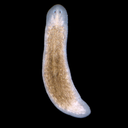Search
About Schmidtea mediterranea
The genus Schmidtea comprises four species of freshwater planarians, predominantly found in Europe, with some populations also present in north Africa, Asia and introduced in regions of America [2, 11]. Among these, Schmidtea mediterranea is the most extensively studied species and serves as a well-established model organism for research in regeneration and stem cell biology [13, 7].
The life cycle of S. mediterranea features two distinct reproductive strategies observed in geographically separated wild populations [10]:
Sexual reproduction: Diploid (2n = 8) sexually reproducing populations are found in the eastern part of the range of the species, including Corsica, Sardinia, Sicily, and one locality in Tunisia. Notably, a triploid (3n = 12) egg-laying population has been identified in Sardinia [4].
Asexual reproduction by fission: Predominantly diploid (2n = 8) fissiparous forms are located in two localities in Catalunya and the Balearic Islands. These individuals exhibit a heteromorphic translocation between the first and third chromosomes, visible in metaphase spreads, with only one chromosome of each homologous pair affected [12, 1]. A triploid (3n = 12) asexual population has also been reported in Menorca [12]. Today, the presence of S. mediterranea in continental Europe is limited to a few artificial ponds at the "Viver dels Tres Pins" in the mountain of Montjuïc, Barcelona [14]. The diploid laboratory strain C4 originates from a nearby spring in Montjuïc.
This is an assembly of the sexual laboratory strain S2F2 of S. mediterranea originally collected in Sardinia that was extensively inbred over 16 generations to a total of 18 inbreeding generations total, including 2 rounds of regeneration-induced self-fertilization of the same individual.
For the alternative haplotype see schMedS3h2.
Picture credit (Creative Commons BY 4.0): Miquel Vila-Farré, Dept. of Tissue Dynamics and Regeneration, Max Planck Institute for Multidisciplinary Sciences
Taxonomy ID 79327
Taxonomy ID 79327
Data source Max Planck Institute for Multidisciplinary Sciences
Variation
This species currently has no variation database. However you can process your own variants using the Variant Effect Predictor:




 More information and statistics
More information and statistics

 Download DNA sequence
Download DNA sequence Display your data in Ensembl Metazoa
Display your data in Ensembl Metazoa

 Update your old Ensembl IDs
Update your old Ensembl IDs
![Follow us on Twitter! [twitter logo]](/i/twitter.png)
